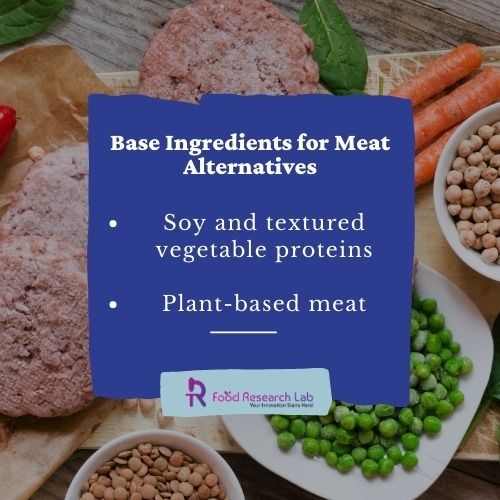Meat alternatives are the imitations of plant-based meat products, and it becomes mainstream due to environmental concerns and health awareness among consumers.
How could meat Alternative be useful in providing all the essential elements that are available in meat-based Products
In Brief:
- Meat alternatives are the imitations of plant-based meat products, and it becomes mainstream due to environmental concerns and health awareness among consumers..
- There are various types of ingredients such as plant protein-based meat, textured vegetables protein-based meat, and soy proteins have been tried in replicating the taste and texture of conventional meats which can replace fillings in baked products patties in burger and pepperonis/toppings in pizzas.
- With the help of advanced technologies and processing techniques, it is possible to make meat alternatives with all the essential attributes that are present conventional meat but with certain limitations.
Introduction
A close up of a sign Description automatically generated Health awareness among the people and sustainable food brought an innovative idea in developing plant protein-based meat. Due to increasing animal diseases and strong demand for meat consumptions, a huge population have been moving from meat to the consumption of vegetable proteins in food products. To meet such huge demand food researchers introduced meat alternatives which are basically plant-based meat. Meat alternatives are also defined as meat analog, which refers to the replacement of meat, and it has become the current trend due to health awareness among common people and for a better environment.
However, consumers have a doubt that how could a plant protein can have all the elements of meat, but the factor that leads to this is because, plant proteins have low fat, low calorie, and consumers are more focused in avoiding natural resources depletion and to reduce greenhouse gas emission. At present, meat alternatives are available in the market, and the products are plant-based meat alternatives, which provides the same quality of taste and textures as like conventional meat. However, meat alternatives are widely distributed in western countries; the rest of the world will become a potential market in the near future.
Base ingredients for meat alternatives Soy and textured vegetable proteins
The introduction of meat alternatives into the food market was started in the early 1960s with the base ingredient soy protein. In olden days, soy protein was the popular ingredient in making meat alternatives like tofu and fermented soy cake as the process development of these products will be simple fermentation technique or processing technique. Later textured vegetable protein has become a versatile food ingredient in making meat alternative as it provides meat-like texture, and it has similar protein quality that conventional meat has. However, there were multiple barriers in accepting plant-based meat because of rich soy flavours due to isoflavones, lipoxygenases and saponins and thus limits the use of meat alternatives made from soy proteins.
(5)Due to the rising demand for healthy food habits, extruded meat alternatives entered into the mainstream in the early 21st century, and the sustainability implications continued to increase in finding alternatives to conventional meat. The advancement in food technology and manufacturing has introduced the extruded meat alternative food products that can accurately imitate the texture and taste of conventional meat products, and the current interest has focussed on the development of meat alternatives from plant-based meat though the technology can outcome the existing limitations and imitate conventional meat products.
(4)
Plant-based meat
The advanced plant-derived ingredients have been used in plant-based meat products which are imitating animal-derived meat, and the development of replicating quality meat attributes often said as the challenges for food product developers. Almost every plant protein-based meat alternative has a different popular ingredient, while the ingredients are made from extracted plant protein and are typically have high sodium.
(3)Limitations
For any advancement in product development and process development in the food and beverages industries, there comes limitation, and it can only be taken care of by food researchers and professionals in food industries. Likewise, meat alternatives demonstrate certain limitations during the phase of the production process, and processing ingredients which include over processing leads to less nutritional attributes, high salt content and genetically modified organisms may produce specific effects in the human body during prolonged usage. There are certain facts that the plant protein-based meat products are inadequate in providing essential amino acids and trace elements, and it becomes very challenging to produce or develop a product that imitates meat nutritional attributes.
(2)The challenges associated with any new innovative developments will be cleanly absorbed, and our experts will provide solutions at the food research lab.
- To promote texture, plant-based meat should be cross-linked and unfolded by using methods like spinning and extrusion.
- In addition, a fungus produced filamentous mycoprotein can be used for fibrous texture for the production of plant-based meat. The mycoprotein has a unique pattern of amino acids, low in fat, high in fibre and protein becomes added advantage.
- For solidifying the structure, plant-based meat should undergo heating, cooling, and/or coagulation treatment.
- To retain high protein content, the recipe should always be associated with water-binding capacity and associated rheological properties.
We have the experience, knowledge and ingredients portfolio to help you develop
Interested in learn more? Get in touch, we’d love to discuss your next project with you
Conclusion
In summary, it is so evident that there is a rising demand in producing meat alternative products and at the same time, there are concerns over selection suitable plant protein sources in making a significant product for consumers concerned about healthy foods and a sustainable environment. None the less, there are limited meat alternatives available in the market and mainly for plant-based meat. In the food research lab, we have carried out several experiments in overcoming the challenges, and some of the key points are mentions as well. Our experts have developed techniques and methods in producing a quality meat alternative product by overcoming the reported challenges as it took several months of work for our research and development team to ensure the standard quality, taste and texture that are equivalent to conventional meat.

Let’s create something Innovative and Delicious together
Food Research Lab strives for excellence in new Food, Beverage and Nutraceutical Product Research and Development by offering cutting edge scientific analysis and expertise.




